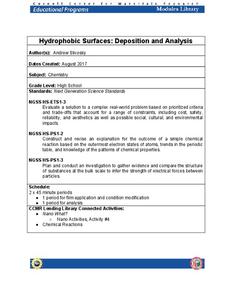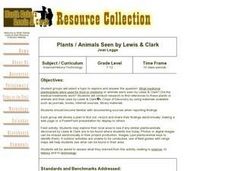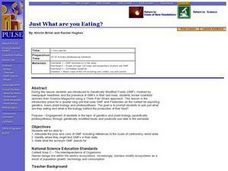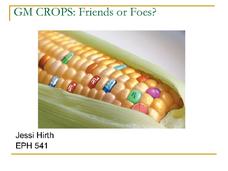American Chemical Society
Why Does Water Dissolve Sugar?
Did you know that if you wait long enough, the M on the outside of an M and M will float to the surface when submerged in water? Learners observe the sugar coating of an M and M while it is dissolving in water. They explain how this...
American Chemical Society
Why Does Water Dissolve Salt?
Individuals explore solubility by modeling how water dissolves salts. They then view a video and compare how well water and alcohol dissolve salts, relating their comparisons to the structure of each molecule.
American Chemical Society
Can Gases Dissolve in Water?
Why does soda fizz when opened? Learners discuss the appearance of bubbles in soda bottles when opened. In groups, they design and complete an experiment comparing the amount of carbon dioxide dissolving in cold versus hot liquids.
Cornell University
Hydrophobic Surfaces—Deposition and Analysis
Couches, carpets, and even computer keyboards now advertise they are spill-resistant, but what does that mean? Scholars use physical and chemical methods to coat surfaces with thin films to test their hydrophobic properties. Then they...
Science 4 Inquiry
States and Phases of Matter
Plasma is the most common phase of matter in our universe. Scholars explore the change of energy as molecules change phases of matter. They rotate through stations, graphing the changes in energy level.
Curated OER
Plants / Animals Seen by Lewis & Clark
Learners conduct research to find references to plants or animals and their uses by Lewis & Clark's Corps of Discovery by using materials available such as journals, books, internet sources, library materials. Groups create a...
Curated OER
Just What are you Eating?
Learners identify and articulate pros and cons of genetically modified foods (GMF) including references to scale of controversy worldwide. Students then identify where they might find GMFs in their diets, read different opinion pieces on...
Curated OER
Periodic Table of Elements
Middle schoolers use reference skills to locate information about the periodic table.
They identify elements by name, atomic number, atomic mass, symbol and properties. Students use mathematical processes to find the number of...
Curated OER
Human Reproduction
In this human reproduction worksheet, students use references to assist them in responding to the questions on the menstrual cycle. They explain what is the menarche and the average length of the menstrual cycle. Students also name the...
Howard Hughes Medical Institute
Microarray Manufacturing Technology
Microarray technology has made advances in scientific research possible. Watch as the videos reveal the manufacturing process of these microarrays. One video shows the automated process while another explains the science behind the...
Teach Engineering
Six Minutes of Terror
Help your class understand the design challenges when trying to land a remote spacecraft on a planet. Class members examine the provided information to understand how each component of a spacecraft is designed in order to safely land a...
Teach Engineering
Copycat Engineers
It's often said that imitation is the sincerest form of flattery. Young engineers learn about biomimicry, which uses nature to generate engineering ideas, in the fifth lesson of nine in a Life Science unit. Working in groups, they select...
Curated OER
Apparent Motion of the Sun
Demonstrate the path of the sun across the sky at different times of the year with an engaging science lesson. Learners use a series of questions and diagrams to examine the movement of the sun and appearance of the sky around their...
Science Geek
Thermochemical Calculations
Viewers learn where the heat goes when phase changes take place with a presentation that explains the latent heat of phase changes, or, more specifically, the molar heat of fusion, solidification, vaporization, and condensation. The show...
Scholastic
Study Jams! Fossil Fuels
Eight slides introduce viewers to the wonders and woes of fossil fuels. How are they formed? How do we use them? How do they harm the environment? And how can we conserve? All of these thoughts are briefly touched upon. In addition to...
California Academy of Science
Earthquakes and Tectonic Plates
Here is a comprehensive package in which middle schoolers learn about types of seismic waves, triangulation, and tectonic plate boundaries. Complete vocabulary, colorful maps, and a worksheet are included via links on the webpage. You...
University of Wisconsin
Designing a Rain Garden
Now it's time for all of the data collected in previous lessons to be applied to the design of a rain garden. This resource can only be used as part of the greater whole, since learners will need to rely on gathered knowledge in order to...
National Park Service
Living & Non-Living Interactions
What better way to learn about ecosystems than by getting outside and observing them first hand? Accompanying a field trip to a local park or outdoor space, this series of collaborative activities engages children in learning about the...
K12 Reader
Limited Resources
Here's a comprehension exercise that asks readers to include direct quotes in their analysis of an article on ways to conserve natural resources.
Texas Heart Institute
Exercise: What Kinds of Activities Are Best?
What happens in the muscles during anaerobic and aerobic exercise, and how does this affect the heart and our overall health? A cross-curricular lesson that introduces learners to the lifelong benefits of exercise, including the ability...
Curated OER
GM Crops: Friends or Foes?
Genetically modified crops—How do you feel about them? Here, explore the benefits and risks of GM crops to inform your opinion.
Virginia Department of Education
Three Types of Rocks
Rock out with the second installment of a five-part series on earth materials and processes. Your budding geologists make observations of given rock samples and posit classification systems for rocks. They then learn about the accepted...
Virginia Department of Education
Modeling the Big Bang Theory
Young astronomers learn about the Big Bang Theory and redshift through a hands-on activity in the last installment of a three-part series. Participants draw dots on balloons and then inflate them to model how galaxies moved farther apart...
Virginia Department of Education
Current Applications in Science
High schoolers may claim to have no interest in scientific revelations and discoveries, but watch how quickly they download a new app onto their state-of-the-art smartphones. Scholars discuss the scientific or technological breakthrough...
Other popular searches
- Using Reference Sources
- Parenthetical Citation
- Teaching Reference Sources
- In Text Citations
- Bibliography and Works Cited
- 3rd Grade Reference Sources
- Bibliographic Citations
- Teaching Mla Citation
- Bibliography Citations
- 4th Grade Reference Sources
- Apa Citation
- Reference Sources Lessons

























